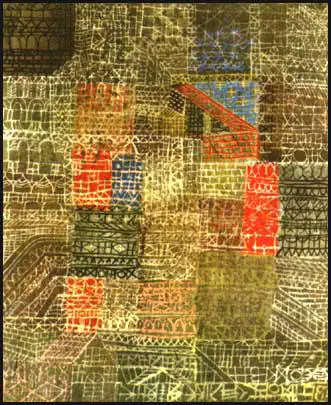Paul Klee
Paul Klee was born in Munchenbuchsee, Switzerland in 1879. He studied art at the Munich Academy of Fine Art (1898-1901) and later became associated with the Blaue Reiter group. Artists in the group believed that they had a responsibility to "heal the gaping wound that separates man from his environment".
Klee was living in Germany during the First World War and in 1916 was called up by the German Army. He was not sent to the front-line and spent some of his time painting aeroplanes.
Klee was involved in the Battle of the Somme. He wrote on 6th December, 1916: "A battalion from the Somme marches up with music, an overwhelming sight. Everything yellow with mud. The unmilitary, matter-of-fact appearance, the steel helmets, the equipment. The trotting step. Nothing heroic, just like beasts of burden, like slaves. Against a background of circus music."
He was still on the Western Front in February, 1918: "This week we had three fatal casualties; one man was smashed by the propeller, the other two crashed from the air! Yesterday, a fourth came ploughing with a loud bang into the roof of the workshop. Had been flying too low, caught on a telephone pole, bounced on the roof of the factory, turned a somersault, and collapsed upside down in a heap of wreckage."
His war experiences appeared in his book, Diaries: 1898-1918. After the Armistice Klee taught at the Bauhaus in Weimar and Dessau. Klee was a brilliant and undogmatic teacher and a stimulating writer on art. The most important book Klee wrote during this period was, Pedagogical Stetchbook (1925).

With the emergence of Adolf Hitler and the Nazi Party in Germany, Klee returned to Switzerland. A large number of his paintings on display in Germany were confiscated by the Nazis as degenerate. The growth of fascism in Europe affected Klee badly and he began to suffer from acute depression. In 1935 Klee developed scleroderma, a rare debilitating disease.
Paul Klee died in Muralto on 22nd June, 1940.
Primary Sources
(1) Paul Klee, diary entry (6th March, 1916)
Singing instructions are no longer given by the clear-voiced sergeant, but by Corporal Bruckner. A neat man with a slight squint that doesn't look bad. First we all read the text together, then he sings the first stanza, fearfully off-key, so that our ears cringe. Then we sing it. Today we learned a horrible piece of trash called "Flag Song". I am living with apes. I realize this seeing them take this unadulterated rubbish with such seriousness.
(2) Paul Klee, diary entry (6th December, 1916)
A battalion from the Somme marches up with music, an overwhelming sight. Everything yellow with mud. The unmilitary, matter-of-fact appearance, the steel helmets, the equipment. The trotting step. Nothing heroic, just like beasts of burden, like slaves. Against a background of circus music.
(3) Paul Klee, diary entry (21st February, 1918)
This week we had three fatal casualties; one man was smashed by the propeller, the other two crashed from the air! Yesterday, a fourth came ploughing with a loud bang into the roof of the workshop. Had been flying too low, caught on a telephone pole, bounced on the roof of the factory, turned a somersault, and collapsed upside down in a heap of wreckage.
(4) Paul Klee, diary entry (2nd November, 1918)
The Reich stands all alone now, armed to the teeth and yet so hopeless! We would now have an opportunity to be an example of how a people should endure its downfall. But if the masses go into action, what then?
